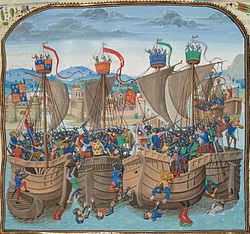Melee
Thank you for being part of the Bharatpedia family! 0% transparency: ₹0 raised out of ₹100,000 (0 supporter) |


A melee (/ˈmeɪleɪ/ or /ˈmɛleɪ/, French: mêlée French pronunciation: [mɛle]) or pell-mell is disorganized hand-to-hand combat in battles fought at abnormally close range with little central control once it starts.[1] In military aviation, a melee has been defined as "[a]n air battle in which several aircraft, both friend and foe, are confusingly intermingled".[2]
History of the term[edit]
In the 1579 translation of Plutarch's Lives of the noble Grecians and Romanes, Sir Thomas North uses the term 'pelmel' to refer to a disorganized retreat.[3] The phrase was later used in its current spelling in Shakespeare's Richard III, 1594:
"March on, ioine brauelie, let vs to it pell mell, / If not to heauen then hand in hand to hell."
The phrase comes from the French expression pêle-mêle, a rhyme based on the old French mesler, meaning to mix or mingle.[3][4]
The French term melee was first used in English in c. 1640 (also derived from the old French mesler,[5] but the Old French stem survives in medley and meddle).[1]
Lord Nelson described his tactics for the Battle of Trafalgar as inducing a "pell mell battle" focused on engagements between individual ships where the superior morale and skill of the Royal Navy would prevail.[6]
The destroyer night action of the second Naval Battle of Guadalcanal on 13 November 1942 was so chaotic, and the opposing ships so intermingled, that an officer on Template:USS later likened it to "a barroom brawl after the lights had been shot out".[7]
Usage in sport[edit]
In Australian Rules Football, the term "melee" is used by the Australian Football League, sports commentators and journalists as a polite term for a brawl or fighting during a football match,[8] where football players physically attack. Melees often start as verbal disagreements between a small number players from the opposing teams, but can quickly escalate into many players from both teams joining in with this physical scuffle.[9]
See also[edit]
Notes[edit]
- ↑ 1.0 1.1 OED 2015.
- ↑ Kumar, DeRemer & Marshall 2004, p. 462.
- ↑ 3.0 3.1 "'Pell-mell' - the meaning and origin of this phrase".
- ↑ "Pell-mell". 26 July 2021.
- ↑ "Melee". 29 November 2021.
- ↑ Fremont-Barnes 2005, p. 38.
- ↑ Frank, Guadalcanal, p. 441.
- ↑ "Laws of Australian Rules Football, 2019 - page 8" (PDF). Australian Football League. Retrieved 2 April 2022.
{{cite web}}: CS1 maint: url-status (link) - ↑ AFL Melees: Pies, Cats, Port, Dons, Demons and Tigers, retrieved 2022-04-02
References[edit]
- Fremont-Barnes, Gregory (2005), Trafalgar 1805: Nelson's Crowning Victory, Osprey Publishing, p. 38 38, ISBN 978-1-84176-892-2
- Kumar, Bharat; DeRemer, Dale; Marshall, Douglas (2004), An Illustrated Dictionary of Aviation, McGraw Hill Professional, p. 462, ISBN 978-0-07-178260-9
- "mêlée n.", Oxford English Dictionary (online ed.), Oxford University Press, March 2015
